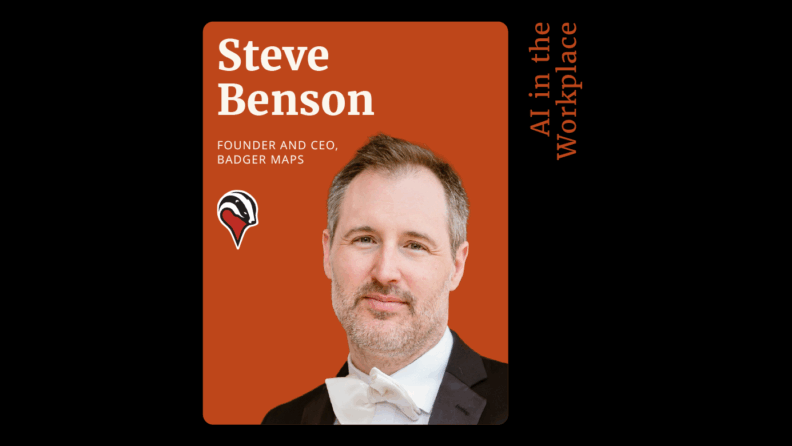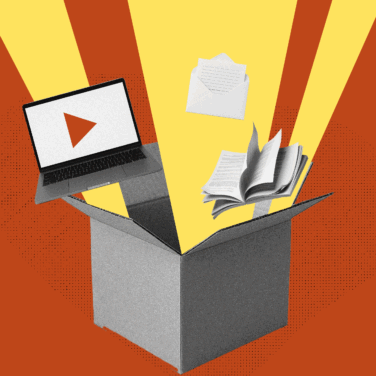AI Integration: Steve Benson uses AI at Badger Maps to enhance productivity without increasing headcount.
Organizational Shift: AI has reduced the need for interns and junior hires at Badger Maps, altering recruitment strategies.
Executive Impact: For executives, AI speeds up decision-making and simplifies data analysis, not a revolutionary change.
AI Adoption: Existing companies can benefit from integrating AI tools into their current software for operational efficiency.
Steve Benson is the founder and CEO of Badger Maps, a mid-sized tech company that upgrades existing CRMs with mapping, routing, and scheduling for salespeople in the field.
He isn't replacing anyone at his company with AI. But he isn't using hiring as a growth lever anymore either.
We interviewed Steve to understand how he's using AI to meet the increasing demands of a growing business instead of upping the headcount. Here's what he had to say.
From Sales Leader to Tech Founder
I'm the CEO and founder of Badger Maps, the #1 App in the Apple App Store for outside and field salespeople.
Before becoming an entrepreneur, I received my MBA from Stanford and worked at Google. During my time at Google, I was named Google Enterprise's Top Sales Executive globally in 2009.
Then, in 2012, I founded Badger Maps for outside and field salespeople to upgrade existing CRMs with mapping, routing, and scheduling. I also host the Outside Sales Talk — a podcast specifically for outside salespeople — and I'm the President of the Sales Hall of Fame.
I didn’t start out with the goal of founding a business. I spent my career in field sales, so I understood the challenges faced by field salespeople firsthand. And when I worked on the Google Maps team, I found out how powerful mobile mapping was. I took what I learned and bootstrapped Badger Maps into what it is today.
Life-Changing Career Advice That Applies in the AI Era
The best advice I was ever given was during a career-day ‘ride along’ with my father’s friend, Bill Moran. I was about 13 years old, and he was a successful, self-made real estate developer — the most successful man I knew. What he said changed my life, and with everything happening with AI right now, I think it applies more than ever.
As we drove around Chicago, looking at buildings he owned or was considering purchasing, he advised me to work for myself. He said that even if I made way less money than I could make at a big company, what I made would be mine. And if I made a lot of money, that would be mine too.
He also told me to never work for a big company because you learn far more working for a small company — your role is more meaningful, in that you have responsibility over a larger percentage of the company.
When I started Badger Maps 20 years later, these thoughts were on my mind, and although I never got to thank him for the advice, it was invaluable to me.
In the age of AI, people working at larger companies will face automation pressures. Their salaries will come under pressure too. And so will their jobs. Working for yourself or for a smaller organization — especially a smaller organization that is growing well — puts you in a better position.
Using AI for Growth Instead of Increasing Headcount
We're a good example, as a mid-sized, growing company. We aren't replacing existing jobs with AI.
We aren't replacing existing jobs with AI.
With that said, AI is effectively replacing new roles that we would have filled as we grow.
With that said, AI is effectively replacing new roles that we would have filled as we grow. We don't have to fill those new roles because AI is doing the work for us or freeing up time in existing roles.
At Badger Maps, AI — and the software supported by it — do a lot of busy work today. People can move faster and do more, especially in Marketing and Engineering. Those roles have seen the biggest changes with AI.
So much of marketing, in particular, was creating content or doing research on how to accomplish different things. AI does all of that now. Though I'll admit that our marketing managers do sometimes catch their teams doing a ton of work manually.
When that happens, their job is to coach the team on how a specific AI tool can accomplish the task much more quickly. That's a big shift for managers.
How AI Is Reshaping Organizational Structure
An exception to this rule of not replacing people is internships. We used to have a well-developed intern program with about 25 interns at a time. That has all but gone away in the age of AI.
We didn't kill the intern program; People just stopped asking for interns, so the recruiting team stopped hiring them. Similar story with junior employees. Now, managers are asking for more mid-level and senior hires instead of junior hires.
It used to make sense for mid-level and senior employees to spend time training and working with junior employees and interns to get work done — you spend 2 hours training someone, and they can do something that you were spending an hour a week on going forward. But those mid-level and senior employees are now reaching for AI for these tasks.
While I wouldn't say AI has changed how I view organizational structure completely, it has had material impacts on how we are structured.
So, while I wouldn't say AI has changed how I view organizational structure completely, it has had material impacts on how we are structured.
What AI Really Means for Executives and Decision Makers
As far as executives and decision makers, here's an unpopular opinion: AI hasn't really been revolutionary. It just sped things up for us.
The biggest benefit, in my view, is that it puts answers at our fingertips that were hard to figure out using the internet a couple of years ago
For example, in the past, I might have had someone in finance research something and explain it to me so we could work through the answer together three years ago. Today, I just spend an hour thinking about it by myself — with the support of AI.
Unlocking AI Already Built Into Existing Software
The best thing that you can do in any time of change is to be open to the new opportunities that present themselves. Right now, that means using AI software.
And one of the first places to look is at the tools you already use.
So often, I see great AI use cases and capabilities being made available in existing software — software that has already been fully trained, adopted, and added to a team’s workflow. People just aren’t taking full advantage of the software. Or worse, they’re looking for a new AI tool to replace it.
For us, some examples are AWS, GitHub, Close, etc. All of them have great AI features. For example, Github is helping our engineers code much faster with AI.
Pair Your CRM With Your GTM Strategy
We rely particularly heavily on our CRM system, Close, on the sales and marketing side. The best CRM system for your company and go-to-market strategy can be a real game changer.
A lot of the CRMs have similar functionality today, but people underinvest in customizing them for their particular needs. Not only customizing them with the setup, but also with connected apps that support their particular Go-to-Market strategies. Whatever your unique situation is, there are apps that will greatly improve your CRM experience.
It’s critical that the marketing stack and sales stack work together — although the tools don't need to come from the same vendor like they used to. Modern software makes these workflows a lot cleaner, even when you’re braiding together the best solutions for your unique market strategy and product.
And AI is getting woven into these workflows, right there in the software.
An AI Tool That Transformed Their Workflows
My favorite AI tool by far, right now, is Grid Squid.
We need to integrate our software with many CRM systems because our customers' data lives in their CRMs. Grid Squid solved a costly and difficult problem for us because we can now integrate our product with our customers' CRMs very quickly.
It relies on AI to build connections faster, and it syncs the customer's CRM data and the data in our product in real time. So, instead of maintaining connectors to many CRMs, we can just maintain our connection to Grid Squid, and it does the rest.
This used to be a big cost for us, in terms of time and effort. The team that does our integrations moves so much faster now that we have integrated Grid Squid's AI.
Building AI Literacy Across Teams
I don't believe companies that are founded after AI existed necessarily have an advantage over companies that already existed. Existing companies have access to the same tools as new companies. And both need to adapt to ever-changing toolsets,
That's why I see AI literacy as a moving target. We keep adopting AI in more and more places as more and more AI enterprise tools come out. It's hard to keep up!
It's critical as a leader to check in with the team on the tools that they are using to make sure they are getting value out of them. If they say a tool is just "meh", you have to encourage them to actively seek alternatives.
Empowering our teams to find the right solutions for them is key. They know best what they need. Managers can offer solutions — and show how their current software can be better utilized. But the people who are actually using the software need to have a say.
The Age of Small Businesses — and AI
I'll end with this: It is a good time to build — or work at — a small company.
Small organizations are able to accomplish more than they could before AI. It gives each individual on the team superpowers.
I'm not sure if this will create more opportunities or if it'll create fewer but greater opportunities. Let's hope it's the former, as the latter may result in a consolidation of wealth.
Follow Along
You can follow Steve's work on LinkedIn, Instagram, X, Facebook, and Quora as he continues to grow his business by increasing AI usage instead of headcount. If you're interested in sales, don't miss his Podcast, Outside Sales Talk Podcast. And check out his business, Badger Maps, as well as the Sales Hall of Fame.
More expert interviews to come on People Managing People!



